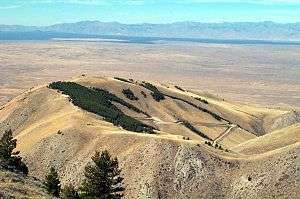Big Southern Butte
Big Southern Butte is the largest and youngest (300,000 years old) of three rhyolitic domes formed over a million years near the center of the Eastern Snake River Plain in the U.S. state of Idaho.[5] In fact, it is one of the largest volcanic domes on earth.[4] It rises approximately 2500 vertical feet (762 m) above the lava plain in southern Butte County, east of Craters of the Moon National Monument.
| Big Southern Butte | |
|---|---|
 Big Southern Butte | |
| Highest point | |
| Elevation | 7,550 ft (2,300 m) [1] |
| Prominence | 2,380 ft (730 m) [2] |
| Coordinates | 43°24′05″N 113°01′26″W[3] |
| Geography | |
| Location | Butte County, Idaho, United States |
| Topo map | USGS Big Southern Butte |
| Geology | |
| Age of rock | 300,000 years[4] |
| Mountain type | Lava dome |
| Climbing | |
| Designated | 1976 |
Big Southern Butte consists of two coalesced lava domes with a base diameter of 6.5 kilometres (4.0 mi) and a combined volume of approximately 8 cubic kilometres (1.9 cu mi).[6]
References
- "Big Southern Butte : visitidaho.org". Idaho Department of Commerce. Archived from the original on 2008-10-08. Retrieved 2008-08-13.
- "Big Southern Butte, Idaho". Peakbagger.com. Retrieved 2012-12-21.
- U.S. Geological Survey Geographic Names Information System: Big Southern Butte
- "Big Southern Butte". Bureau of Land Management. 2007-10-09. Archived from the original on October 16, 2008. Retrieved 2008-08-13.
- "Formation of Big Southern Butte, eastern Snake River Plain, Idaho". The Educational Multimedia Visualization Center of the Dept. Geological Sciences, U.C.S.B. Archived from the original on 27 June 2007. Retrieved 2007-06-17.
- Haller, Kathleen; Spencer Wood (January 2004). Geological Field Trips in Southern Idaho, Eastern Oregon, and Northern Nevada. Department of Geosciences, Boise State University. p. 138. ISBN 978-0-9753738-0-4.
External links
This article is issued from Wikipedia. The text is licensed under Creative Commons - Attribution - Sharealike. Additional terms may apply for the media files.